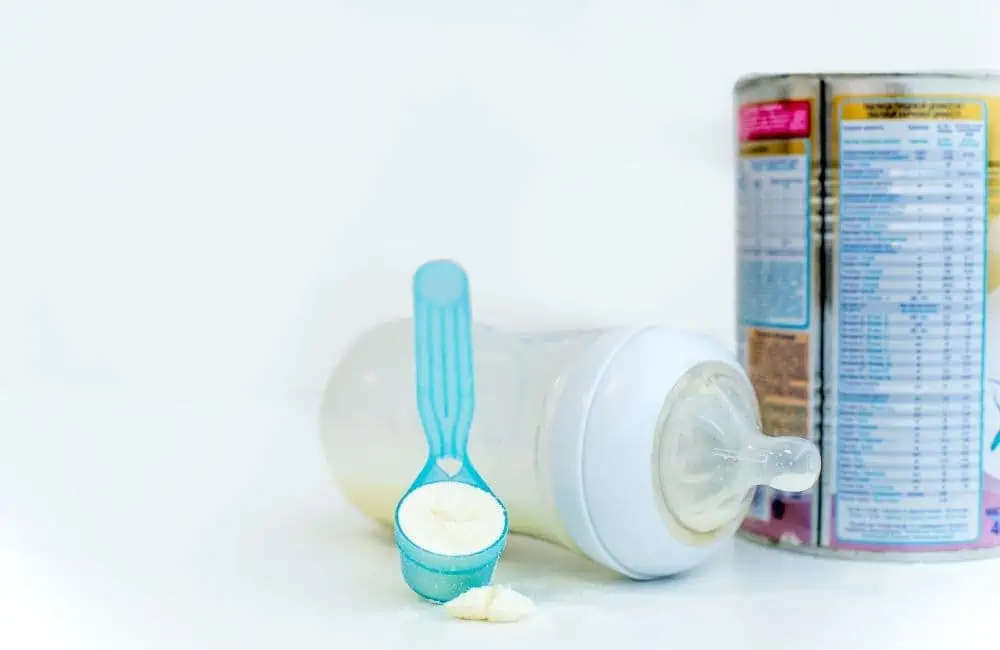What Is the Statute of Limitations for an NEC Baby Formula Lawsuit?
- Last Updated: July 27th, 2023

Attorney Jessica Paluch-Hoerman, founder of TruLaw, has over 28 years of experience as a personal injury and mass tort attorney, and previously worked as an international tax attorney at Deloitte. Jessie collaborates with attorneys nationwide — enabling her to share reliable, up-to-date legal information with our readers.
Legally Reviewed
This article has been written and reviewed for legal accuracy and clarity by the team of writers and legal experts at TruLaw and is as accurate as possible. This content should not be taken as legal advice from an attorney. If you would like to learn more about our owner and experienced injury lawyer, Jessie Paluch, you can do so here.
Fact-Checked
TruLaw does everything possible to make sure the information in this article is up to date and accurate. If you need specific legal advice about your case, contact us by using the chat on the bottom of this page. This article should not be taken as advice from an attorney.
What Is the Statute of Limitations for an NEC Baby Formula Lawsuit?
NEC is a severe gastrointestinal illness that predominantly affects premature infants.
NEC occurs in about one out of every 1,000 premature infants, according to the Cleveland Clinic.
Full-term infants rarely contract NEC.
NEC occurs when bacteria accumulate in a preterm infant’s intestinal tract, cause intestinal tissue death, and erode the intestinal wall.
NEC can occur in the small or large intestines.
Eventually, if left untreated, NEC can eat through the intestinal wall and create perforations, through which bacteria can escape into the abdominal cavity or into the bloodstream.
This can lead to a life-threatening bacterial infection and other complications.
Some of the symptoms of NEC include abdominal pain and swelling, green and yellow vomit, bloody stools, diarrhea, fatigue, refusal to eat, inability to gain weight, fluctuations in heart rate, and changes in body temperature.
However, an allergy to an ingredient can also cause an upset stomach.
Consider switching to a formula for babies with a sensitive stomach.

Preterm infants often receive baby formula for extra nourishment because they were born prematurely.
Some of the most common formulas that premature babies receive are cow’s milk-based baby formulas like Enfamil and Similac.
But in recent years, studies have shown that receiving bovine milk-based baby formulas like Enfamil and Similac puts preterm babies at a higher risk of developing NEC than breastmilk alone.
As a result, parents of premature babies who developed NEC after being fed Enfamil and/or Similac baby formula products have begun filing lawsuits against the manufacturers of these products.
However, parents must file their lawsuit within a specific period of time dictated by each state’s statute of limitations for their case to be legally valid.
Table of Contents
What Are NEC Lawsuits?

Lawsuits have been filed by parents of preterm infants who were diagnosed with NEC after receiving cow’s milk-based formulas marketed under the Enfamil or Similac brand names.
The lawsuits allege that the manufacturers of Enfamil and Similac (Mead Johnson and Abbott Laboratories, respectively) failed to warn the public about the potential risks associated with feeding cow’s milk formula to premature babies.
The lawsuits also allege that the manufacturers marketed the products as equivalent to breastmilk.
Plaintiffs have filed lawsuits in federal courts across the country, though many have chosen to file in Illinois since both Mead Johnson and Abbott Laboratories have headquarters in Chicago.
Other parents have filed individual lawsuits in the state where their infants were diagnosed with NEC after being fed Enfamil or Similac products.
As the number of cases grows, it is possible that the court will decide to combine individual NEC lawsuits into a mass tort.
A mass tort is different from a class-action lawsuit because although there are numerous plaintiffs, every plaintiff is treated as an individual and retains all the individual rights they would have been afforded if they had pursued a personal injury lawsuit on their own.
The Statute of Limitations for NEC Baby Formula Lawsuits
As with all personal injury cases, there is a statute of limitations on product liability cases, including NEC baby formula lawsuits.
Parents who plan to file an NEC lawsuit on behalf of their infant must do so within a specific period of time.
If they fail to file their lawsuit before the statutory deadline expires, they forfeit the right to pursue legal action against the manufacturer.
The time period dictated by the statute of limitations, however, depends on the state where the lawsuit is being filed.
The statute of limitations deadline could also be different for the child than it is for their parents, who will likely have a much shorter timeframe to bring a lawsuit.
In Illinois, where the manufacturers of Similac and Enfamil are located, parents generally have two years to file a lawsuit on behalf of their child.
This is the same deadline that applies to most personal injury cases in Illinois.
However, it should be noted that Illinois does have a “discovery rule” that allows for the statute of limitations period to be extended under certain circumstances.
In some cases, the harm caused by NEC might not be “discovered” immediately the way other personal injuries, such as broken bones, would be.
The statute of limitations in NEC baby formula cases might not begin until a preterm infant has been officially diagnosed, even though they likely will have received bovine milk-based formula for some time before they began to show symptoms of the disease.
Parents who are concerned about the statute of limitations in their state should seek out the advice of an experienced NEC baby formula lawsuit attorney.
Once the deadline set forth in the statute of limitations has passed, it will be nearly impossible for a parent to bring an NEC lawsuit on behalf of their preterm infant.
TruLaw and its team of seasoned lawyers fight on behalf of individuals harmed by drugs, devices, chemicals, and other products.
To date, TruLaw and its partner law firms have successfully collected over $3 billion through verdicts and settlements in all 50 states.
If you believe your baby developed NEC due to cow’s milk-based formulas such as Enfamil and Similac, you may be eligible to file a lawsuit.
Use our Instant Case Evaluator to find out if you are eligible for a Necrotizing Enterocolitis (NEC) lawsuit today.

Managing Attorney & Owner
With over 25 years of legal experience, Jessica Paluch-Hoerman is an Illinois lawyer, a CPA, and a mother of three. She spent the first decade of her career working as an international tax attorney at Deloitte.
In 2009, Jessie co-founded her own law firm with her husband – which has scaled to over 30 employees since its conception.
In 2016, Jessie founded TruLaw, which allows her to collaborate with attorneys and legal experts across the United States on a daily basis. This hypervaluable network of experts is what enables her to share the most reliable, accurate, and up-to-date legal information with our readers!
Here, at TruLaw, we’re committed to helping victims get the justice they deserve.
Alongside our partner law firms, we have successfully collected over $3 Billion in verdicts and settlements on behalf of injured individuals.
Would you like our help?
At TruLaw, we fiercely combat corporations that endanger individuals’ well-being. If you’ve suffered injuries and believe these well-funded entities should be held accountable, we’re here for you.
With TruLaw, you gain access to successful and seasoned lawyers who maximize your chances of success. Our lawyers invest in you—they do not receive a dime until your lawsuit reaches a successful resolution!
AFFF Lawsuit claims are being filed against manufacturers of aqueous film-forming foam (AFFF), commonly used in firefighting.
Claims allege that companies such as 3M, DuPont, and Tyco Fire Products failed to adequately warn users about the potential dangers of AFFF exposure — including increased risks of various cancers and diseases.
Depo Provera Lawsuit claims are being filed by individuals who allege they developed meningioma (a type of brain tumor) after receiving Depo-Provera birth control injections.
A 2024 study found that women using Depo-Provera for at least 1 year are five times more likely to develop meningioma brain tumors compared to those not using the drug.
Suboxone Tooth Decay Lawsuit claims are being filed against Indivior, the manufacturer of Suboxone, a medication used to treat opioid addiction.
Claims allege that Indivior failed to adequately warn users about the potential dangers of severe tooth decay and dental injuries associated with Suboxone’s sublingual film version.
Social Media Harm Lawsuits are being filed against social media companies for allegedly causing mental health issues in children and teens.
Claims allege that companies like Meta, Google, ByteDance, and Snap designed addictive platforms that led to anxiety, depression, and other mental health issues without adequately warning users or parents.
Transvaginal Mesh Lawsuits are being filed against manufacturers of transvaginal mesh products used to treat pelvic organ prolapse (POP) and stress urinary incontinence (SUI).
Claims allege that companies like Ethicon, C.R. Bard, and Boston Scientific failed to adequately warn about potential dangers — including erosion, pain, and infection.
Bair Hugger Warming Blanket Lawsuits involve claims against 3M — alleging their surgical warming blankets caused severe infections and complications (particularly in hip and knee replacement surgeries).
Plaintiffs claim 3M failed to warn about potential risks — despite knowing about increased risk of deep joint infections since 2011.
Baby Formula NEC Lawsuit claims are being filed against manufacturers of cow’s milk-based baby formula products.
Claims allege that companies like Abbott Laboratories (Similac) and Mead Johnson & Company (Enfamil) failed to warn about the increased risk of necrotizing enterocolitis (NEC) in premature infants.
Here, at TruLaw, we’re committed to helping victims get the justice they deserve.
Alongside our partner law firms, we have successfully collected over $3 Billion in verdicts and settlements on behalf of injured individuals.
Would you like our help?












